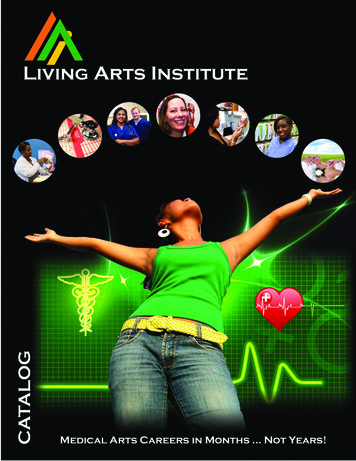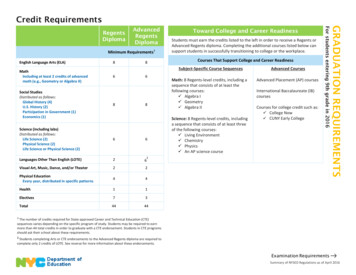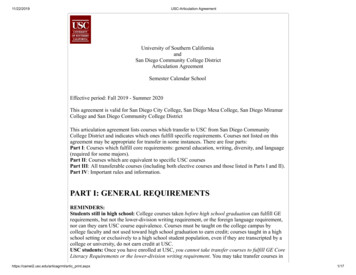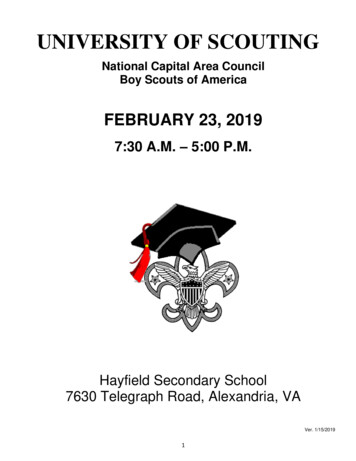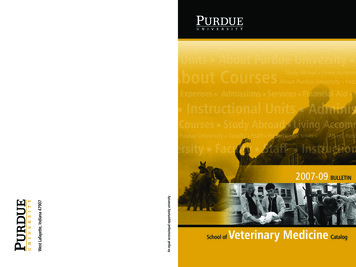
Transcription
Study Abroad Living Accommodations Information Admissions Services Financial Aid Graduation Requirements sity Faculty Staff Instructional Units About Purdue University modations Information About Courses Services Financial Aid Graduation Requirements Expenses e University Faculty Staff Study Abroad Living Accomm About Purdue University Facu Admissions Services Financial Aid G Instructional Units Adminis g Accommodations Information About Courses Study Abroad Living Accomm About Purdue University Faculty Staff Instructional Units About Purdue University Faculty Staff About PurdInstructionAn equal access/equal opportunity universityWest Lafayette, Indiana 479072007-09 BULLETINSchool ofVeterinary Medicine Catalog
Purdue University PublicationsBulletins are issued by each of the divisions listed below and are available for free.Forward requests to Purdue Marketing Communications, pmc@pmc.purdue.edu; telephone(765) 494-2034. The mailing address is: Purdue Marketing Communications;Purdue University; South Campus Courts, Building D; 507 Harrison Street; West Lafayette,IN 47907-2025. Please write legibly and include your zip code.College and School BulletinsCollege of AgricultureCollege of Consumerand Family SciencesCollege of EducationCollege of EngineeringSchool of Health SciencesCollege of Liberal ArtsKrannert School of ManagementSchool of NursingSchool of Pharmacyand Pharmaceutical SciencesCollege of ScienceCollege of TechnologySchool of Veterinary MedicineProduced by Purdue Marketing Communications 1303306lOther PublicationsFacts About PurdueGeneral InformationGetting Involved at PurdueIntroducing Purdue UniversityNurturing the SpiritParent HandbookSummer SessionUniversity RegulationsWelcome to Purdue Campus Map
School of Veterinary Medicine2007 – 09Published by Purdue UniversityWest Lafayette, IndianaThe information contained in this bulletin is subject tochange as a result of action by federal and/or stategovernments, the trustees of Purdue University, andthe administration of Purdue University. Questionsconcerning the contents of this bulletin should bedirected to the appropriate University departmentor official.Purdue University Bulletin (USPS 450-800)Volume 105May 2005Number 4Published monthly except January and July by PurdueMarketing Communications, Purdue University, SouthCampus Courts, Building D, 507 Harrison Street, WestLafayette, Indiana 47907-2025. Periodical postagepaid at Lafayette, Indiana 47901. POSTMASTER:Send address changes to PURDUE UNIVERSITYBULLETIN, Purdue Marketing Communications, Purdue University, South Campus Courts, Building D, 507Harrison Street, West Lafayette, Indiana 47907-2025.
t Purdue UniversityAdmissionsAdmissions Inquiries and ProceduresCampus VisitsPreprofessional RequirementsAdmission to the Preprofessional ProgramThe Purdue Statewide Academic SystemNondiscrimination Policy StatementExpensesRefunding of Fees and TuitionFinancial AidLiving AccommodationsStudent ServicesInformation TechnologyLibrariesStudy AbroadAbbreviationsPreprofessional CurriculumSchool of Veterinary MedicineHistoryAccreditationAcademic StructureVeterinary Medicine as a CareerCareer OpportunitiesAdmission to the Professional SchoolVeterinary Student ExpensesPlan of Study and Professional CurriculumVeterinary Technology as a CareerAdmission to the Veterinary Technology ProgramVeterinary Technology Curricula2 2 Veterinary Technologist Plan of StudyGeneral Requirements for Associate of Science DegreeGeneral Requirements for Baccalaureate DegreeGraduate Veterinary TechniciansGraduation RequirementsLegal Requirements for Practice in the United StatesGraduate StudyInformation about CoursesSchool of Veterinary Medicine Administration, Faculty, and Teaching StaffVeterinary Medical AdministrationHeads of Instructional DepartmentsBasic Medical SciencesVeterinary Clinical SciencesComparative PathobiologyBoard of Trustees and Officers of Administration and InstructionInstructional UnitsIndex
About Purdue University About Purdue UniversityServing people was Purdue University’sfounding principle as the Indiana link in thenationwide chain of land-grant colleges anduniversities. Purdue, which opened its doors onSeptember 16, 1874, with a student body of 39and a staff of six, has grown into a world-classeducational system of 69,600 students and about18,400 faculty and staff members across Indiana.The West Lafayette campus comprises 39,200students and nearly 15,000 faculty and staffmembers.Purdue graduates have been to the moon, tothe highest levels of business and government,and to Sweden to receive the Nobel Prize. Theroster of about 384,000 living alumni includesnoted CEOs, agriculturalists, scientists, teachers, engineers, pharmacists, journalists, veterinarians, and athletes who have made notablecontributions to our society.Purdue has been a vital resource to the people of Indiana, the nation, and the world — fromits land-grant foundation to its status today asa prominent land-, sea-, and space-grant university that champions its missions of learning,discovery, and engagement.Making higher education available to thepeople was the plan in 1862 when President Lincoln signed the Morrill Act. That act gave publiclands to any state that would use proceeds fromthe sale of the land to support a college thatwould teach agriculture and the mechanic arts.Three years after passage of the land-grantact, the Indiana General Assembly voted to takeadvantage of the provisions. Competition amongvarious areas of the state culminated in 1869when the assembly accepted 150,000 fromLafayette civic leader John Purdue, 50,000from Tippecanoe County, and 100 acres of landfrom local citizens. In appreciation, the institution was named Purdue University and wasestablished in West Lafayette. The Universityofficially opened for classes September 16,1874.Purdue quickly established prominence inagriculture and engineering, answering theimmediate needs of the people. And it has sincebuilt solid reputations in veterinary medicine,technology, a range of sciences, pharmacy, nursing, management, liberal arts, health sciences,education, and consumer and family sciences.The physical growth of campus also hasbeen dramatic. Originally the campus consistedof three buildings rising out of Indiana farm-land. Today the main campus encompasses 160major buildings. Nearly 600 million worth ofnew construction and renovation is under wayor scheduled to occur at Purdue in West Lafayette during the first seven years of the newmillennium.The Purdue system has expanded to includePurdue campuses at Fort Wayne, Hammond,and Westville, and degree programs at IndianaUniversity-Purdue University Indianapolis andIndiana University-Purdue University Columbus. Purdue’s College of Technology exists in10 Indiana communities in addition to the WestLafayette campus.The mission of answering the people’s needsgoes beyond educating productive graduateand undergraduate students. Purdue is a highlyrespected research institution, with researchand sponsored program expenditures of over 395.9 million in the 2004–05 fiscal year on theWest Lafayette campus. In addition, the University offers its expertise to the state of Indianain numerous ways, as well as to business andindustry, retailers, and teachers.Purdue’s impact in Indiana is evident dailythrough its spectrum of learning, discovery,and engagement. The University has an annualimpact of more than 2.5 billion on Indiana’seconomy. Purdue’s march toward preeminencehas solid footing in the development of Discovery Park, where the University’s talent and ideasare pacesetters in interdisciplinary, world-leading nanotechnology and biosciences researchand discovery.Outreach programs include the Purdue University Cooperative Extension Service, withsites in each of Indiana’s 92 counties serving asa gateway to lifelong learning. The Office forContinuing Education and Conferences servestens of thousands of adult learners annuallythrough Purdue courses for personal and professional development offered on campus, offcampus, and by distance education.Purdue is also a cultural and recreational hubfor people in northwestern Indiana. The EdwardC. Elliott Hall of Music, one of the largestproscenium theaters in the world, houses 6,025spectators for music, dance, theatre, and popentertainment. Boilermaker fans crowd RossAde Stadium, Mackey Arena, and the Intercollegiate Athletic Facility for Big Ten Conferencefootball, basketball, and volleyball.
Veterinary MedicinePurdue University ranks among the 25 largest universities in the United States. Its position of leadership and influence in teaching andresearch stems in large part from its worldwideacclaim in engineering, science, and technology,but its preeminence is bolstered by an exciting array of academic disciplines. On the WestLafayette campus, there are 370 majors/specializations to choose from within the followingcolleges and schools:College of AgricultureAmong the nation’s highest ranked and mostprestigious institutions, the college offers excellent teaching, research, extension, and international programs. More than 40 programs ofstudy prepare scientists, engineers, business representatives, producers, information specialists,and resource managers for professional careersin the world’s food and natural resource systems.See www.agriculture.purdue.edu/oap.College of Consumer and Family SciencesThe college, one of the largest and highestranked of its kind in the nation, prepares menand women for careers related to the needs offamilies and consumers. Students can choosea bachelor of science degree program from 13majors in the areas of family studies and childdevelopment, consumer sciences and consumerbusiness, hospitality, nutrition, health and fitness, tourism, and education. The Department of Hospitality and Tourism Managementalso offers an Associate’s degree program. Seewww.cfs.purdue.edu.College of EducationThe state accredited and nationally rankedand accredited College of Education preparesoutstanding teachers, instructional leaders,administrators, school counselors, counselingpsychologists, curriculum specialists, teachereducators, and educational researchers for theessential roles they play in guiding the educationof our youth. Through interdisciplinary instructional programs in teacher education, research inthe educational process, and engagement withIndiana schools, College of Education graduatesare well prepared for a rewarding career in education. The dedicated and experienced facultymembers, some of whom are known internationally as experts in their fields, are respectedleaders in a wide range of curriculum areas andare actively engaged in research. Together ourstudents and faculty share a passion for learning,teaching, and changing the world. The collegeoffers undergraduate and graduate degrees in avariety of disciplines. In addition to the teachereducation programs offered by the College ofEducation, teacher preparation programs arealso offered through other colleges and schoolsacross campus. See www.education.purdue.edu.College of EngineeringThe College of Engineering is internationally known for the quality and scope of itsprograms. Students launch their careers witha common first-year program in the Department of Engineering Education. Once theyhave completed that program, they choosefrom undergraduate curricula in aeronauticsand astronautics, agricultural and biological,biomedical, chemical, civil, computer, construction engineering and management, electrical,food process, industrial, interdisciplinary, landsurveying and geomatics, materials, mechanical,or nuclear engineering. Every school and department offers graduate degree programs. Seewww.engineering.purdue.edu.School of Health SciencesThe school offers a variety of health-related studyareas, including medical technology, medicalphysics, health physics, industrial hygiene, andrelated environmental and general health scienceprograms. It also administers the prepharmacy,premedical, predental, and pre-allied healthprograms, including occupational and physicaltherapy and dental hygiene. Students completingthe programs and gaining experience in the fieldmay qualify for professional certification. Seewww.healthsciences.purdue.edu.College of Liberal ArtsThe college offers essentially all of the traditional disciplines of the humanities, social andbehavioral sciences, and creative arts. Majorsand minors are available in 11 departments:audiology and speech sciences; communication;English; foreign languages and literatures; healthand kinesiology; history; philosophy; politicalscience; psychological sciences; sociology andanthropology; and visual and performing arts.Students can prepare themselves in more than50 majors, including 11 undergraduate interdisciplinary programs. See www.cla.purdue.edu.
About Purdue UniversityKrannert School of ManagementDegree programs include accounting, management, industrial management, and economics. Accounting and management programsfocus on finance, marketing, operations, humanresources, and strategic planning. The industrialmanagement program combines managementand technical education with a manufacturingmanagement, engineering, or science minor.The accounting program combines a management background with extensive educationin accounting principles and practices. Allprograms include coursework in the arts,humanities, and international and cross-culturalaspects of modern business. See www.krannert.purdue.edu.School of NursingThe School of Nursing prepares students fromdiverse backgrounds for careers as professionalnurses. The nationally accredited undergraduateprogram prepares a student for licensure as aregistered nurse (R.N.) and for entry into graduate studies. A diverse mix of liberal arts, science,and nursing courses gives students a scientific,multidisciplinary education. Small clinicalclasses give students practical experience inhealth assessment, maternal child care, mentalhealth, acute care, and community health nursing. This program admits nursing majors at thefreshman year and offers early, hands-on clinical courses. The R.N.-to-B.S.N. program allowsregistered nurses to complete their baccalaureaterequirements. The Second Degree Baccalaureate Program allows students who hold a degreein another field to pursue a B.S. in Nursing. Themaster’s degree program prepares advancedpractice nurses. The Doctor of Nursing Practice(D.N.P.) delivers a curriculum from post-baccalaureate to the practice doctorate degree, with anemphasis on care of rural, underserved populations. See www.nursing.purdue.edu.School of Pharmacy andPharmaceutical SciencesThe school offers an accredited professional program leading to the Doctor of Pharmacy degree.This program combines a basic and appliedscience background as well as clinical experience allowing students to function as licensedpharmacists to provide pharmaceutical care.The two prepharmacy years can be taken eitherat Purdue’s School of Pharmacy or at another institution. The school also has a four-year,non-licensure-eligible B.S. in PharmaceuticalSciences degree designed for entry-level pharmaceutical industry positions or as a foundationfor advanced education. See www.pharmacy.purdue.edu.College of ScienceActuarial science, biological sciences, chemistry,computer science, earth and atmospheric sciences, mathematics, physics, statistics, math andscience secondary school teaching, and interdisciplinary science programs prepare studentsfor immediate careers or advanced study. Premedical, predental, and preveterinary options;a cooperative education program; study abroad;and honors programs are available. Studentsmay pursue official minors in other areas outside their major. Enrollment in sciences whiledeciding on a major in any field is encouraged.A highly qualified faculty, state-of-the-art facilities, and ongoing research keep teaching up todate. See www.science.purdue.edu.College of TechnologyThe eight departments and 22 specializations inthe College of Technology prepare students tomeet the technological needs of business, industry, and government. Technology students begintaking courses in their major as early as thefreshman year. Courses and other opportunitiesallow students to experience a variety of handson, real-world applications. The college awardsassociate, bachelor’s, and graduate degrees. Seewww.purdue.edu/technology.School of Veterinary MedicineThis professional school, which graduated itsfirst class in 1963, has assumed a leading position nationally and internationally in veterinaryeducation. The school is one of only 28 in theUnited States that grant the Doctor of VeterinaryMedicine degree. The Veterinary TechnologyProgram is accredited by the American Veterinary Medical Association (AVMA) and awardsAssociate of Science and Bachelor of Sciencedegrees. The Associate of Science degree is alsooffered via distance learning. The VeterinaryTechnology Program at Purdue is the only suchprogram in the state of Indiana and one of onlytwo AVMA programs administered by a schoolof veterinary medicine. See www.vet.purdue.edu/admissions.
Veterinary MedicineThe Graduate SchoolAll programs of graduate study and research leading to advanced degrees are under the GraduateSchool’s jurisdiction. Programs of study lead tothe degrees of Doctor of Philosophy, Doctor ofAudiology, Doctor of Nursing Practice, Educational Specialist, Master of Arts, Master of Artsin Teaching, Master of Fine Arts, Master ofBusiness Administration, Master of Science, andMaster of Science in various professional fields.More than 70 robust programs with researchand practice-oriented curricula are available inoptions that include the sciences, arts, engineering, agriculture, management, and humanities aswell as exciting interdisciplinary programs. TheGraduate School also offers several graduatelevel, academic credit certificate programs. Seewww.gradschool.purdue.edu.AdmissionsAdmissions Inquiries andProceduresAll inquiries about admissions (whether youare entering from high school, transferring fromanother institution, or re-entering after beingout of school) should be addressed to: Officeof Admissions, Purdue University; SchlemanHall; 475 Stadium Mall Drive; West Lafayette,IN 47907-2050; admissions@purdue.edu; (765)494-1776.Your first inquiry concerning admissionshould include (1) the amount of educationyou have completed; (2) your plans for further education, indicating your area of interest;and (3) the approximate date of your entranceto Purdue.When you are entering directly from highschool, the Office of Admissions suggests thatyou file your application for admission early inyour senior year. Transfer students should applyas early as possible.Prospective students and their families also canmake individual visits; the Office of Admissions offers multiple visit sessions on a dailybasis, Monday through Friday, including walking tours of campus. Students planning a visit tocampus should first contact the Office of Admissions or visit the Admissions Web site — www.purdue.edu/Admissions/undergrad — for further information.Core 40 — Indiana StudentsCampus VisitsPurdue University applauds the state’s efforts tostrengthen Indiana’s high school students’ academic preparation and encourages all studentsto complete the Core 40 requirements. In addition to considering high school courses, Purduewill continue to use other factors such as gradepoint average, class rank, trends in achievement,honors courses, and test scores when reviewingapplications for admissions. We will evaluateapplicants on an individual basis and in relationto their requested majors. Program limitationsalso will continue to be a factor in admission tocertain majors.A visit to the campus and an interview with anadmissions counselor will help you determinewhich educational programs at Purdue are inkeeping with your educational background andyour future career interests. Such a campus visitis especially appropriate during your junior yearin high school.The Office of Admissions is open each weekday from 8:00 a.m. to 5:00 p.m. No appointmentis necessary; however, if you would like a tourof the campus, contact the Office of Admissionsbefore your visit.Students interested in Purdue have avariety of opportunities to visit the campus.Some programs, such as Fall Preview Daysand Introducing Purdue, offer more formalagendas that include admissions presentations,school and program sessions, and campus tours.If you expect to apply for admission to the professional program in the School of VeterinaryMedicine, you must first complete a two- tothree-year preprofessional (or preveterinary)curriculum. The preprofessional curriculum atPurdue is offered through either the College ofAgriculture or College of Science. Your choiceof school is dictated by your undergraduatecareer interest (e.g. biology, animal science,biochemistry, etc.).If you are a student in one of the otherschools or colleges of the University and havecompleted the required courses or their equivalents, you are eligible to apply for admissionto the professional program in the School ofPreprofessional Requirements
AdmissionsVeterinary Medicine. Since enrollment in theprofessional school is limited, completion of thepreprofessional course requirements does notensure that you will be admitted to the Schoolof Veterinary Medicine.Admission to thePreprofessional ProgramYour admission as a new student into the Schoolof Veterinary Medicine at Purdue is determinedby a holistic review that evaluates rank in class,test scores, ability to be successful, grade average in college preparatory subjects, grades incourses related to the degree objective, trendsin achievement, completion of minimum highschool subject matter expectations (see table),the strength of the college preparatory program,personal attributes, and information providedby your high school counselor. All applicantswho have not completed a full year of collegework are required to provide SAT or ACT scores(including the writing sections of these tests).Students are encouraged to take either the SATor ACT in the spring of their junior year. Allapplicants must graduate high school or havea GED. For admission to the preveterinary curriculum in the College of Agriculture, yourrecord must include: SubjectsEnglishAcademic math*Laboratory science†Foreign languageMinimum Semester Expectations8664 For admission to the preveterinary curriculum in the College of Science, your recordmust include: SubjectsEnglishAcademic math*Laboratory science†Foreign languageMinimum Semester Expectations8664* Includes algebra, geometry, trigonometry,calculus, etc.† Includes biology, chemistry, physics, earth/spacescience, physiology/anatomy, etc.I n satisfying the entrance requirement in laboratory science, it is advisable to have at leastone year of chemistry. If it is possible for you to exceed the above requirements, biology andphysics should be studied in addition to chemistry.Because this catalog is used for two to threeyears, you should refer to www.purdue.edu/Admissions/Undergrad for the most current andaccurate information about admission to theSchool of Veterinary Medicine.Advance Deposit on FeesIf you are a new student admitted for the fallsemester, you must make a nonrefundableadvance deposit of 100. This deposit is toreserve a place for you on the new student roster. Students admitted on or before April 10 mustsubmit the deposit by May 1. Those admittedafter April 10 must submit the deposit withinthree weeks (21 days) after the date of the offerof admission.If you receive an offer of admission but failto make the required deposit of 100 withinthe time allotted, you automatically forfeit yourright to a place on the new student roster.The 100 advance deposit will be appliedto your first semester fees and is not associated with your University housing applicationor contract.Early Enrollment forSuperior StudentsIf you are a high school student with a highlysuperior scholastic record during the first threeyears of high school, you may qualify for admission to Purdue without high school graduation.The regular entrance requirements are supplemented by certain objective measurements ofyour qualification to advance to the universitylevel. In this way, the University tries to recognize and provide for individual rates of learningand achievement.As a nongraduate of high school, you will beconsidered for admission if you (1) have earned12 or more credits toward graduation; (2) havea highly superior school record; (3) are stronglyrecommended by your principal; (4) have theapproval of your parents for college entrancewithout high school graduation; (5) qualify byyour performance on prescribed admissionstests; and (6) are approved by the UniversityAdmissions Committee.Purdue cannot guarantee high school diplomas under this arrangement, but it cooperates
10Veterinary Medicinewith whatever arrangement the state or localschool system may have for awarding a highschool diploma to a successful participant inthis plan.Admission with Advanced StandingOn the basis of your CEEB Advanced PlacementExamination, Purdue advanced credit examination, or high school record, you, as a first-yearstudent, may receive advanced credit and/oradvanced placement.Transfer StudentsIf you are transferring from another college oruniversity to the Purdue preveterinary programin the College of Agriculture or the College ofScience, you must comply with the followingprocedures:1. Submit an official undergraduate applicationfor admission.2. Forward official transcripts of work done atinstitutions previously attended (both highschool and college). A separate transcript mustbe provided by each institution, regardless ofwhether credit is requested.To be considered for admission, transfer students should apply as soon as possible for theterm they wish to enter. To be admitted, studentsmust have the necessary grade point average atthe time they apply (and any required collegecoursework) and meet high school subject matter requirements.Because this catalog is used for two tothree years, you should refer to www.purdue.edu/Admissions/Undergrad for the most currentand accurate information about admission to theSchool of Veterinary Medicine.Transfer (or Advanced) CreditCredit for courses at Purdue University willbe given for work of equivalent character andamount successfully completed at anotheraccredited college. Advanced standing willbe determined on the basis of these credits.Advanced credit will be regarded as provisionaland may be withdrawn by the director of admissions upon recommendation of the head of thedepartment concerned if dependent work is notsatisfactorily completed.Purdue University is a supporter of and aparticipant in the Indiana Core Transfer Library(CTL), a growing list of courses that will transfer from one public Indiana institution to another.As the Core Transfer Library is developed, information will be available at www.che.state.in.us.When credit earned at another college oruniversity is transferred to Purdue and acceptedtoward advanced standing, the credit is converted into terms of Purdue courses and appliedto the program of study. It remains for you,the student, to complete the program, and yourschedule of courses each term will be adjustedaccordingly. It does not follow that your classification at Purdue or the time necessary forcompletion of the required work for a degreewill be in line with what was expected at theprevious institution. Grades are not transferred;only credits in courses are recorded.Students participating in college-creditcourses taught concurrently for high school andcollege credit during the regular school day bylocal high school teachers must validate thecredit by submitting satisfactory results on theCollege Board Advanced Placement Examination or the Purdue advanced credit examination,as determined by the subject department. Thedetermination of use of transfer credit in part orin full to satisfy graduation requirements is theresponsibility of the school head or his or herdesignated representative, in accordance withthe regulations of the University faculty.All credentials are submitted with the understanding that they become the property of Purdue University.Early Registration — Day on CampusThe Student Access, Transition and SuccessPrograms (SATS) and the Office of Admissionsinvite you to campus for one day of early registration during the summer before your firstsemester as a new student. This day is set asidefor you to meet with your academic counselorand to select your first-semester classes. TheUniversity then will proceed with the registration process and mail you a fee statement andyour class schedule.Student Orientation and SupportProgramsStudent Access, Transition and Success Programs (SATS) is responsible for the coordinationof initiatives that help students prepare for, transition into, and succeed in Purdue University’sacademically rigorous environment.A division of the Office of Enrollment Management, SATS offers several programs to help
Admissionsbeginning and transfer students adjust to Purdue.Boiler Gold Rush is for new, beginning studentsand includes a variety of activities designed tohelp them make a smooth transition into Purdue. Students who begin their studies at othertimes of the year also have the opportunity toparticipate in orientation. Invitations to thosedifferent programs are mailed to the students atthe appropriate times.SATS programs include Day on Campus,Learning Communities, Orientation Programs(such as Boiler Gold Rush and Welcome Programs), Parent and Family Programs, the PurdueOpportunity Awards program, the Purdue HelpDesk, and the West Central Indiana RegionalTwenty-first Century Scholars site. For moreinformation on any of these programs, pleasevisit www
University-Purdue University Indianapolis and Indiana University-Purdue University Colum-bus. Purdue's College of Technology exists in 10 Indiana communities in addition to the West Lafayette campus. The mission of answering the people's needs goes beyond educating productive graduate and undergraduate students. Purdue is a highly


